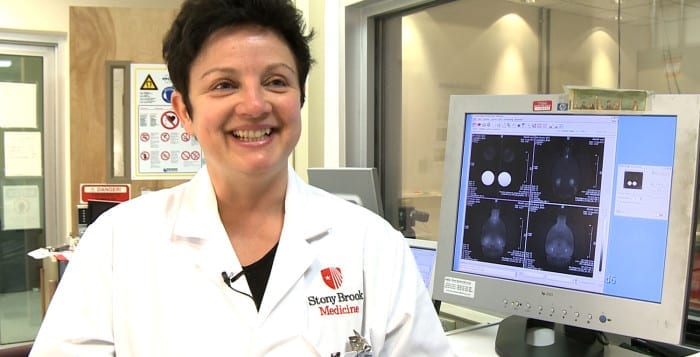Sleeping doesn’t just provide a break from the daily grind, prevent you from chowing down on more Oreo cookies, or keep you out of trouble when it gets dark. It may also serve an important brain-cleaning function, getting rid of tau and beta amyloid proteins.
Merely shutting your eyes and letting the sandman sprinkle dust on your forehead may not be enough. You might actually help your brain, over the long term, with the way you sleep.
Helene Benveniste, a professor of anesthesiology and radiology and vice chair for research in the Department of Anesthesiology at Stony Brook University, recently conducted research on anesthetized rodents, tracking how the glymphatic system worked in various sleep positions. The animals were better at flushing tau and beta amyloid proteins from their brains when they slept laterally, or on their sides, than when they slept on their stomachs. Resting on their backs wasn’t as efficient as sleeping on their sides, although it was better than face down.
These proteins aren’t just a part of everyday maintenance. They likely play a role in the onset of Alzheimer’s disease and other age-related neurological problems, Benveniste said.
Since Benveniste published her study in the Journal of Neuroscience in early August, she has received a flood of emails from around the world, including from Brazil, France and Colombia, with people asking about various sleep positions and neurological disorders.
The Stony Brook professor said it is too soon after this study to come to any conclusions about sleep or preventing cognitive disorders. For starters, she and a research team that included scientists at the University of Rochester, NYU Langone Medical Center and Stony Brook conducted the studies on animal models, rather than on humans.
“In general, the rodent is a pretty good model for core aspects of human brain function,” said Dennis Choi, the chairman of the Neurology Department at Stony Brook. The specifics, however, can differ from one species to another. As a result, Benveniste said, “I don’t think anybody should panic” about the way he or she sleeps.
Scientists know that in the glymphatic pathway, cerebrospinal fluid moves through the brain and exchanges with interstitial fluid to get rid of waste. In the studies with rodents, the face down position seemed to divert the cerebrospinal fluid away from the brain, Benveniste said.
The research could be another step toward understanding how sleep might help with the human glymphatic system.
An anesthesiologist who does clinical work one day a week, Benveniste said she started thinking about conducting this kind of study a few years ago. Benveniste is a “good example of a physician/scientist,” Choi said.
Two years ago, a study by a co-author on the paper, Maiken Nedergaard from the University of Rochester, showed that sleep or general anesthesia enhances the clearance of waste from the brain of rodents.
“Since I am an anesthesiologist, I immediately thought about how body/head positions during anesthesia might affect clearance,” Benveniste said. The data took over a year and a half to collect and analyze.
“The quantitative aspect of this system should not be overlooked. To find out how these [proteins] are moving through the brain is a huge issue,” she said. The collaboration with Jean Logan, senior research scientist in the Department of Radiology at NYU “enabled us to move forward.”
Benveniste used a dynamic contrast MRI method to calculate the exchange rates between the cerebrospinal fluid and the interstitial fluid. The next step in these studies is to move toward the human brain. Benveniste said she is working with colleagues at the National Institutes of Health.
Just from observing wildlife outside the lab, Benveniste said many animals tend to sleep in what she and her team found was the optimum position for clearing waste in rodents: on their sides. “Even elephants lie down in recumbent, lateral positions,” she added.
As for Benveniste, she said she naturally sleeps on her right side. She said she’s well aware of how well she slept during the night. If she wakes up after getting enough rest, she said she thinks, “this was a good night’s sleep. This was good for my brain.”
Benveniste, who lives in Northport with her husband, Peter Huttemeier, is also an advocate of exercise for brain health, although she doesn’t suggest marathon running. “I do think this may be affecting the cerebrospinal fluid flow dynamics,” she said, adding that she wants to take up yoga.
Benveniste is eager to continue to build on this sleep study. “The workings of this system so far has been an amazing exploratory adventure,” she said.





